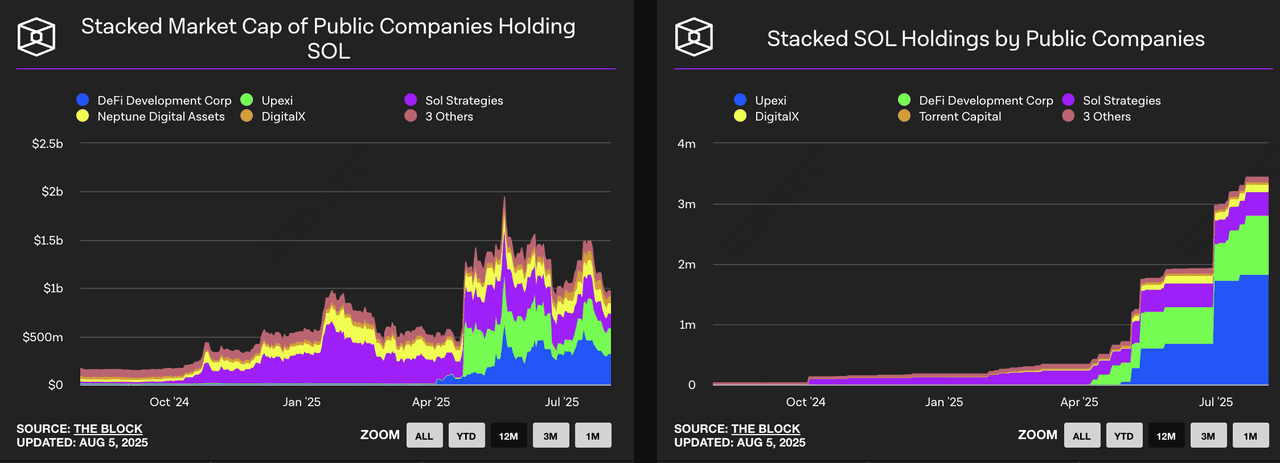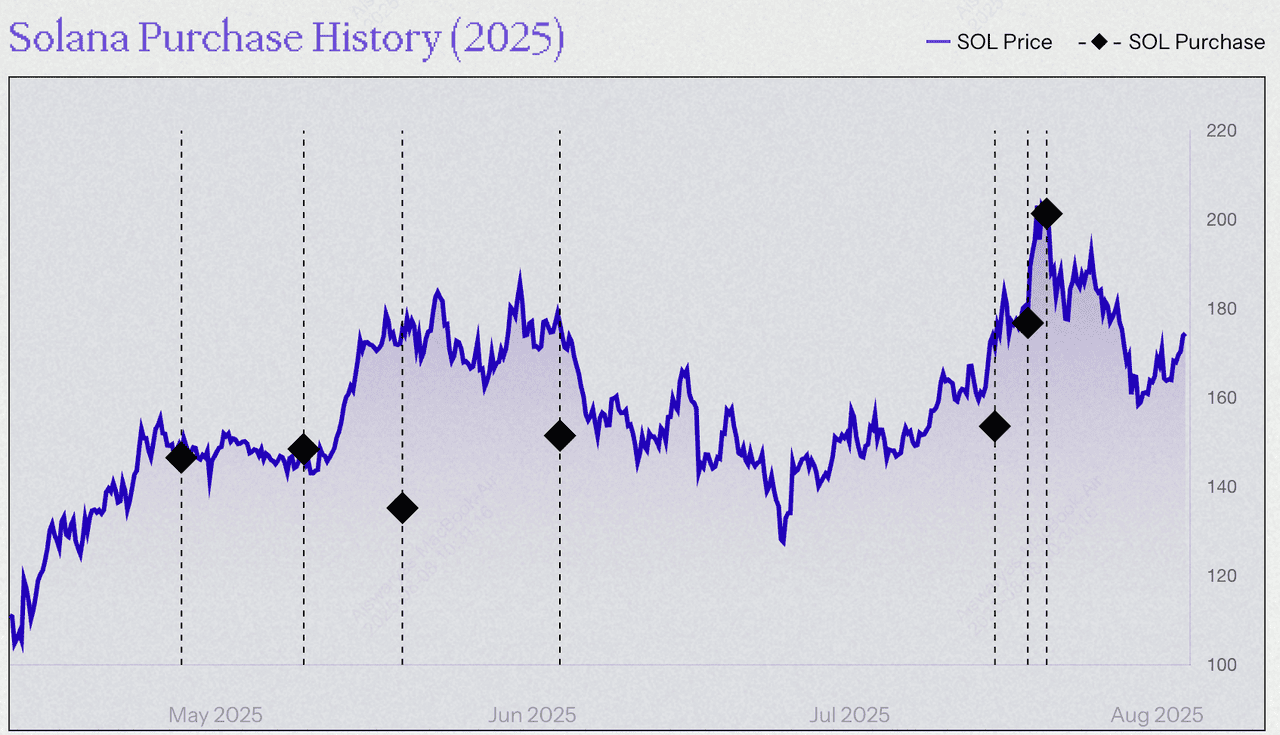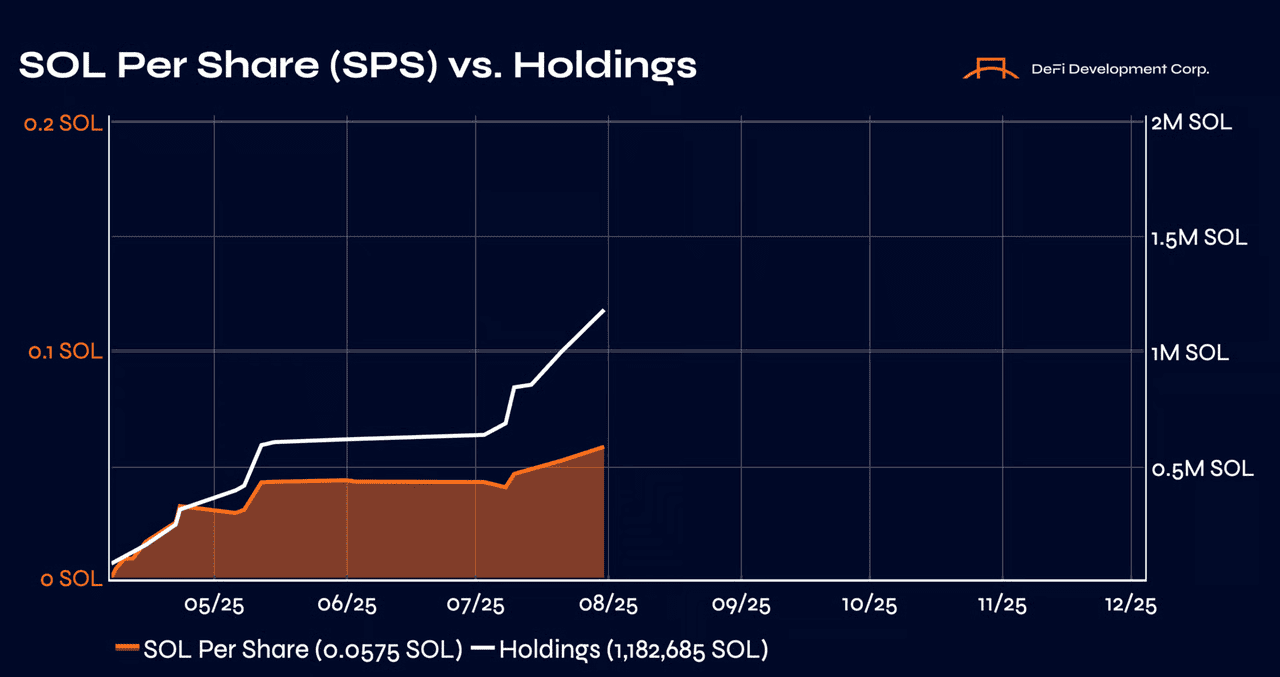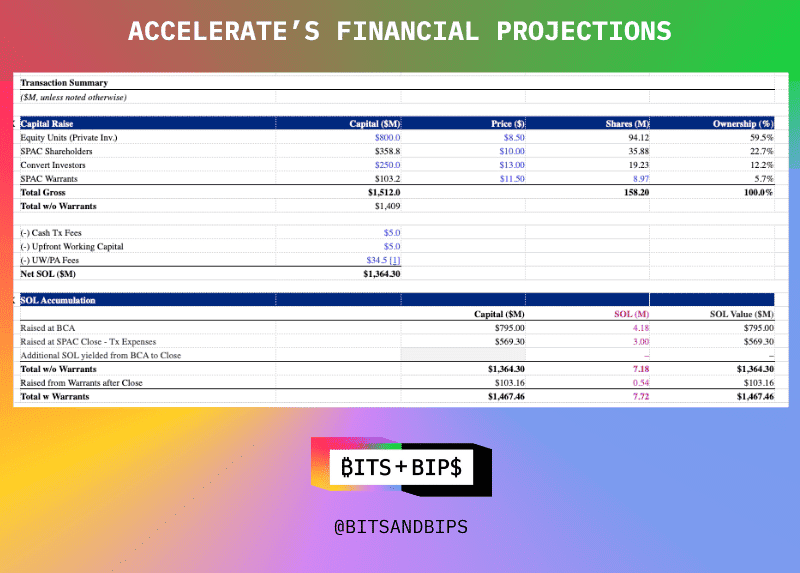As of August 2025, public companies, with a combined market cap worth just under $970 million, collectively hold 3.44 million SOL in their treasuries, marking a sharp acceleration in institutional adoption of the
Solana blockchain. This shift is driven by more than just price speculation: Solana offers high throughput, ultra-low transaction costs, and staking yields averaging 7–8% annually, giving treasury managers both growth potential and a steady income stream.
Market cap and SOL holdings of public companies with Solana treasuries | Source: TheBlock
The launch of the REX-Osprey
Solana Staking ETF in July 2025, which has already surpassed $100 million in assets under management, is further legitimizing SOL as a yield-generating institutional asset. Companies are not only
buying SOL but also staking it, often through their own validator infrastructure, to capture rewards and strengthen the network’s decentralization. This active approach stands in contrast to passive Bitcoin holdings and positions Solana as one of the most dynamic assets in the growing corporate treasury landscape.
Discover the top public companies holding Solana (SOL) in 2025, why corporate treasuries are embracing SOL for
staking yields and blockchain utility, and the risks and future outlook for institutional adoption.
What Is a Solana Corporate Treasury?
A Solana corporate treasury refers to a company holding SOL, the native token of the Solana blockchain, as part of its reserve assets. This is similar to how businesses might hold
BTC in a
Bitcoin treasury or
ETH in an
Ethereum treasury. The concept builds on the strategy made famous by
Strategy (former MicroStrategy), whose Bitcoin accumulation helped establish crypto as a legitimate corporate treasury asset.
Unlike traditional assets such as cash or government bonds, and even unlike passive BTC or ETH holdings, SOL can be actively put to work. Companies often stake their SOL to help validate transactions and secure the network. In return, they earn staking rewards that average 7 to 8 percent annually, paid in additional SOL. For example, a firm with 1 million SOL could earn approximately 70,000 to 80,000 SOL each year, depending on network conditions and validator performance.
Companies typically build their Solana treasuries using a mix of funding strategies:
• Equity raises to secure capital from investors
• Convertible notes that convert to shares later, minimizing upfront dilution
• Discounted locked-token deals, where SOL is purchased below market value with a holding requirement, creating built-in gains upon unlock
Through this approach, a Solana treasury becomes more than a crypto investment. It turns into a yield-generating, blockchain-native asset that strengthens a company's participation in the Solana ecosystem, following the evolution of corporate treasury strategies from Bitcoin to Ethereum, and now to Solana.
Why Companies Are Holding SOL: Key Benefits
Corporate treasuries are increasingly turning to Solana as a way to combine long-term asset growth with steady on-chain income, while gaining a foothold in one of the fastest-growing blockchain ecosystems.
Solana staking rewards and APYs | Source: StakingRewards
1. High Staking Yields: One of the main attractions of Solana for corporate treasuries is its annual staking yield of around 7–8%. This is significantly higher than the yields from most savings accounts or U.S. Treasury bonds, which often fall below 5%. For example, a company holding 1 million SOL, valued at roughly $170 million in August 2025, could earn 70,000–80,000 SOL per year in rewards, worth about $12–14 million at current prices. These rewards are paid in SOL, giving firms the potential for both recurring income and capital appreciation if SOL’s price rises.
2. Operational Integration: Many companies aren’t just holding SOL; they’re actively participating in the network by running their own validator nodes. This allows them to directly process transactions, secure the blockchain, and capture validator commissions in addition to staking rewards. For instance, DeFi Development Corp and SOL Strategies both operate validators, ensuring they retain control over their staking operations while contributing to Solana’s decentralization and stability.
3. Strategic Differentiation: Adding SOL to a corporate balance sheet offers a clear point of differentiation compared to firms that only hold
Bitcoin or
Ethereum. While Bitcoin serves primarily as a store of value and Ethereum offers smart contract functionality with staking, Solana combines speed, scalability, and low fees with the ability to earn yield. This positions companies as early adopters of next-generation blockchain infrastructure, signaling innovation to shareholders, partners, and the market. It also aligns their finances with a rapidly growing ecosystem of
DeFi apps, NFTs, and tokenized real-world assets being built on Solana.
What Are the Top Public Companies Holding Solana (SOL) in 2025?
A growing list of publicly traded companies is adopting Solana as a core treasury asset, combining the network’s high-speed infrastructure with attractive staking yields. While each firm’s approach varies, from aggressive accumulation to cautious, yield-focused holdings, they all share a belief in SOL’s potential as both a financial and strategic asset.
1. Upexi Inc. (NASDAQ: UPXI)
Upexi's Solana purchase history 2025 | Source: Upexi
• SOL Held: ~1.9–2.0 million
• Current Value: ≈ $320 million
Upexi has become the largest known corporate holder of SOL, growing its position from roughly 735,000 tokens at the end of June 2025 to over 2 million by early August, a 172% increase in just one month. The expansion was funded primarily through $200 million in equity raises and convertible notes, with a portion of tokens purchased at mid-teens discounts to market prices, creating built-in gains for shareholders.
Almost all of Upexi’s SOL is staked, generating an estimated $65,000 in daily rewards at around an 8% APY. The company has effectively mirrored
Michael Saylor’s Bitcoin treasury playbook, but with Solana’s faster settlement, lower transaction costs, and native yield, making it a case study in altcoin-driven corporate finance.
2. DeFi Development Corp. (NASDAQ: DFDV)
SOL per share (SPS) vs. Holdings | Source: DeFi Dev Corp.
• SOL Held: ~1.18 million
• Current Value: ≈ $199 million (unrealized gain ~$37M)
DeFi Development Corp., the first public company to center its treasury strategy entirely on Solana, has rapidly grown into one of the largest corporate SOL holders. Originally a commercial real estate technology platform, the company pivoted to digital assets in April 2025, leveraging a $5 billion equity line of credit to fund its expansion. In its latest move, DFDV purchased 110,466 SOL at an average price of $166.61, a transaction worth approximately $18.4 million. This brought its total holdings, including staking rewards and other on-chain earnings, to 1,293,562 SOL as of August 1, 2025, representing a 9% increase from the prior month.
The company’s key performance metric, SOL per share (SPS), rose to 0.0618, a 7% increase from July’s 0.0575, and management has set a long-term goal of reaching 1.0 SPS by 2028 - one SOL for every share outstanding. DFDV stakes its SOL across multiple validators, including its own infrastructure, to capture native yields and transaction fees. Beyond holding and staking, the firm is active in the
Solana DeFi ecosystem, exploring opportunities that can compound returns while reinforcing its position as a long-term participant in the network’s growth.
3. SOL Strategies Inc. (CSE: HODL)
• SOL Held: ~392,667
• Current Value: ≈ $66 million (unrealized gain ~$4M)
SOL Strategies Inc. has steadily expanded its Solana position since mid-2024, increasing its holdings to 420,707 SOL as of August 27, 2025. The company’s accumulation strategy has been primarily financed through convertible note offerings, enabling it to scale its SOL exposure without immediate equity dilution. At current market prices, its SOL treasury is valued at $101 million CAD, making it one of the largest dedicated SOL holders on the Canadian Securities Exchange.
Approximately 60% of its holdings are staked via institutional-grade validators, generating a blended annual yield in the 6%–8% range. This approach not only provides consistent on-chain income but also strengthens the network’s decentralization. By pairing long-term treasury growth with active validator operations, SOL Strategies positions itself as both a major investor and a core infrastructure contributor in the Solana ecosystem, aligning financial performance with the blockchain’s ongoing expansion.
4. Torrent Capital Ltd. (TSX-V: TORR)
Torrent Capital's Solana holdings | Source: Torrent Capital
• SOL Held: ~40,039
• Current Value: ≈ $6.7 million
Torrent Capital’s SOL position is smaller than other corporate holders, but its approach is deliberate. The firm began accumulating in early 2025, adding 13,657 SOL in March before building toward its current stake.
About 75% of Torrent’s SOL is staked, generating modest but consistent passive income. This yield-supported growth strategy aligns with Torrent’s broader focus on early-stage, high-growth investments that have asymmetric upside potential.
5. Bit Mining Ltd. (NYSE: BTCM)
• SOL Held: ~27,191
Best known for its
Bitcoin mining operations, Bit Mining is now making an aggressive move into Solana. In August 2025, the company purchased 27,191 SOL for $4.9 million and launched a self-operated validator to begin staking immediately.
The acquisition is part of a larger plan to raise up to $300 million for SOL purchases and infrastructure expansion. This shift diversifies Bit Mining’s revenue streams, moving it beyond Bitcoin and into high-yield blockchain participation.
6. Accelerate (Planned)
Accelerate's financial projections | Source: Unchained Crypto
• Target Treasury: $1.5 billion
Accelerate is a newly formed Solana treasury company led by Joe McCann, founder and former CEO of hedge fund Asymmetric Financial. The firm plans to go public via a SPAC merger with Gores X Holding and raise up to $1.51 billion through a combination of private investment in public equity (PIPE), convertible debt, SPAC proceeds, and warrant sales. If successful, Accelerate would surpass Upexi to become the largest SOL-holding public company, with an estimated 7.32 million SOL, valued at over $1.36 billion at current prices, earmarked for purchase after fees and expenses.
The company’s pitch emphasizes offering investors exposure to SOL at a net asset value close to 1, potentially allowing them to capture significant upside if its stock price follows the trajectory of other crypto treasury companies. However, analysts have warned of risks such as post-PIPE sell-offs and market volatility. While questions remain about fundraising progress and leadership optics, given McCann’s recent closure of Asymmetric’s liquid fund, Accelerate’s ambitious plan signals the next stage in large-scale institutional accumulation of Solana, with a targeted launch timeline by the end of 2025.
7. iSpecimen Inc. (NASDAQ: ISPC) (Planned)
• Target Treasury: $200 million
iSpecimen, a biospecimen marketplace, announced plans to build a $200 million Solana-based corporate treasury in partnership with digital asset advisory firm BlockArrow Capital. The initiative will be supported by Coinbase Custody for insured, institutional-grade storage.
The strategy includes acquiring SOL for staking and potential future integration into decentralized research infrastructure. While still in the planning phase, the move signals how non-crypto-native companies are using blockchain assets to modernize operations and diversify their balance sheets.
What Are the Top Risks of a Solana Corporate Treasury?
Holding Solana in a corporate treasury can be highly rewarding, but it comes with significant risks that must be managed carefully. The most immediate is price volatility; SOL has a history of double-digit percentage swings in a matter of days. For example, in July 2025 alone, the token’s price ranged from above $185 to below $160, meaning a company holding 1 million SOL could see paper value changes of $25 million or more in a single week. This volatility can affect quarterly earnings, balance sheet stability, and investor confidence, especially for firms financing their purchases with debt or equity raises.
Regulatory and operational risks also play a major role. Staking rewards, which average 7–8% annually, may face new tax or reporting rules as governments refine cryptocurrency regulations. In addition, network reliability, while much improved, remains a factor, as Solana has experienced outages in past years that could temporarily disrupt staking income or validator operations. There’s also liquidity risk: while Solana is one of the most traded cryptocurrencies, selling millions of tokens quickly during a market downturn could push prices down further. To mitigate these issues, companies often use diversified validator strategies, insured custody solutions, and structured selling plans to protect both their yield and principal.
Future Outlook for Solana Treasuries and Corporate SOL Holders
Corporate treasuries are evolving, and Solana is becoming a prominent part of this shift. Adoption is accelerating beyond early Bitcoin-focused strategies, driven by Solana’s combination of yield-generating staking, fast transaction speeds, and a growing ecosystem of DeFi, NFTs, and real-world asset tokenization. As more companies explore multichain treasury models, including SOL,
ETH, and occasionally
BNB, digital assets are likely to play a more strategic role in balance sheet management.
Looking ahead, potential SEC approval of a
spot Solana ETF could significantly boost institutional demand by providing regulated, exchange-traded exposure to SOL without requiring direct token custody. Likewise, the growth of Solana staking ETFs, such as the REX-Osprey Solana Staking ETF (already managing over $100 million in assets), could make yield-bearing SOL exposure more accessible to funds, pensions, and corporate treasuries. These developments would not only increase liquidity but could also help stabilize long-term demand.
However, while the potential rewards are substantial, corporate SOL holdings remain exposed to sharp price volatility, evolving regulatory frameworks, and network performance risks. Treasury managers must balance these opportunities with robust risk controls, diversification strategies, and ongoing compliance oversight before committing substantial capital to Solana or any other cryptocurrency.
Related Reading






